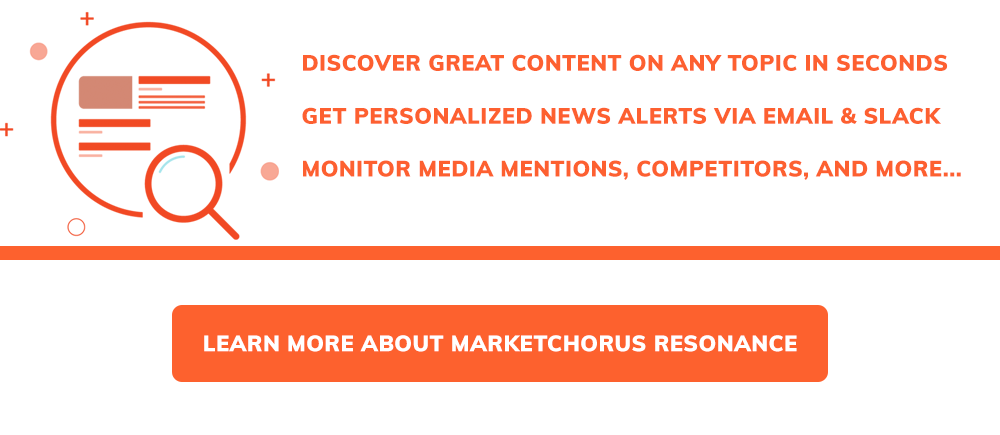With the average amount of time required to produce a blog post steadily increasing year over year (source below), and the steep competition in every niche, content marketing is a time-consuming and risky endeavor.
Time is money, and the more time that gets invested into a piece of content, the greater the risk…
The average blog post takes 3 hours and 57 minutes to write …up 65% from 2014.
(Source: Orbit Media)
It’s no small thing to create quality content these days. Readers will only stick around if what you’ve created can actively help them. “Good” isn’t good enough anymore…
Most content marketers have satisfied themselves (and their brand’s needs) through sheer volume, rather than quality -and this worked to a degree. But this strategy is unsustainable.
Simply stated, content marketers are faced with a growing demand for increasingly good content and, thanks to COVID-19, most of us are working with smaller budgets and teams. To live up to these expectations, we’ll almost certainly need to create more effective content in less time.
With the rise of artificial intelligence technology, like machine learning (ML), predictive analytics, natural language processing (NLP), etc., many of the time-consuming tasks that have weighed down content marketers in the past can be automated.
Let’s look at a few ways that AI technology can streamline your content efforts…
Track news stories with automated alerts
Churning out redundant content in volume isn’t a winning strategy…but producing a wealth of timely content around news in your industry, is a high-grade best practice.
Google appreciates fresh, timely content and will reward you for consistent efforts, but staying on top of all the news in your space can be very challenging. It depends on your industry, of course, but many of us (especially in tech, marketing, health, etc) could drown in the content produced in our niche every day.
Just imagine the effort that’s required to monitor a developing news story today, as it’s being told across hundreds, or thousands, of websites and social media profiles.
Take the topic “remote working during COVID-19” for example. Compiling and summarizing all the articles on this subject as they are published would take several hours each day. And most of that time would be spent Googling in frustration.
Now imagine you could find all the recently published relevant articles in a few seconds, by providing an example article on the same topic to an intelligent search engine.
Even better, imagine you could sort those articles by the amount of engagement they’ve received on social media, or their likelihood to trend. That would be very useful, no?
These are both real use cases for MarketChorus Resonance, a content intelligence platform that monitors consumer and industry news, and its impact on social media (see it in action).
Here is an example of this software at work:
First we start by searching with a relevant article (this one). When the results are displayed a few seconds later, we’re looking at a collection of the most relevant, and most engaged, related articles published within the last 7 days.
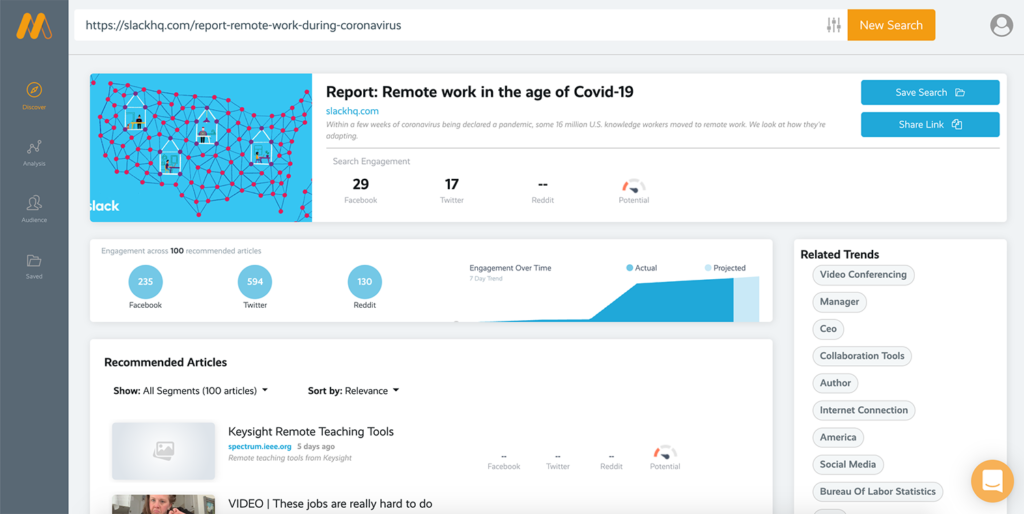
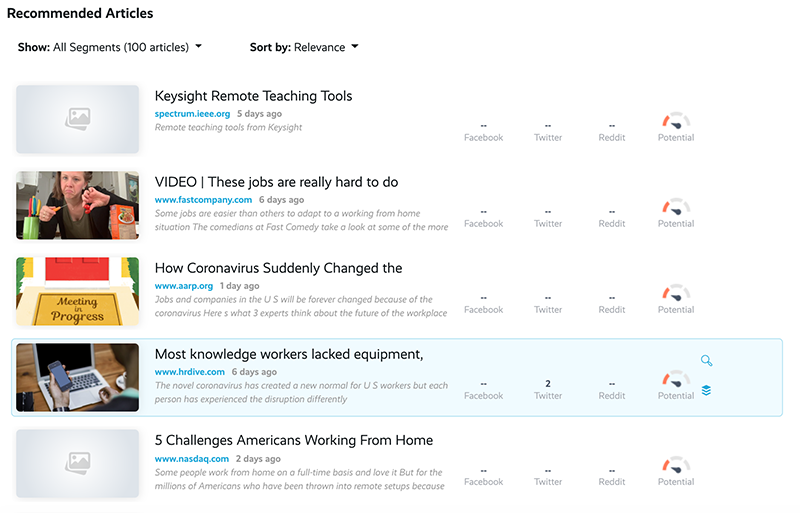
Spot emerging trends early
Read through these results to see how your topic is currently being covered. Spot the articles most likely to have a significant impact with the potential meter. Review these articles, and click the magnifying glass beside them to start a new search with any article that grabs your attention.
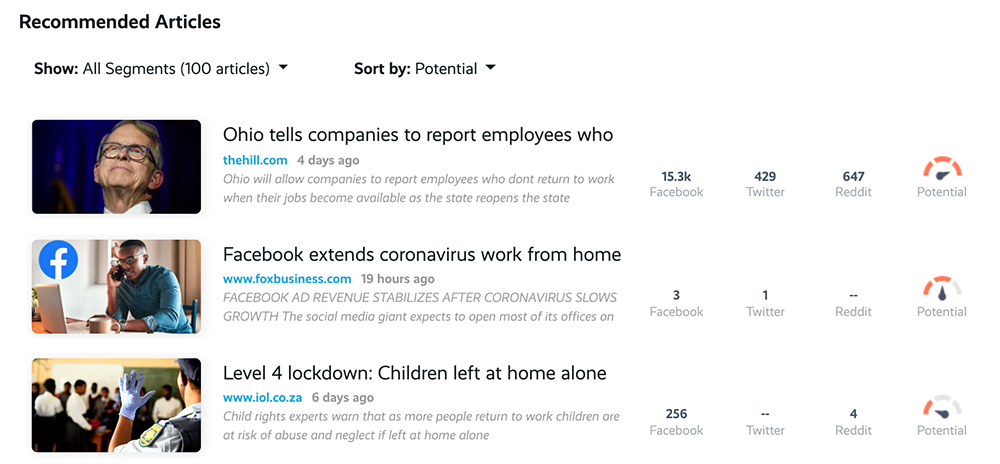
Think of Potential like a tell-tale that shows which way the wind is blowing. If a topic, or an article, is gaining engagement quickly the gauge goes up. There are 3 stages on the Potential gauge, which translate roughly to “Not Trending”, “Starting To Trend”, and “Already Trending”.
Sort by Potential to get a quick view of where the conversation around your topic is heading.
Discover untapped themes within your topic
Digital discussions take place across many articles, videos, social media posts, and other media –and evolve in real-time. You can’t rely on keyword searches to track an evolving discussion like this, but machine learning and natural language processing algorithms work this magic easily by matching content based on context rather than keywords.
NLP makes it possible to associate meaning with terms, so that when searching for content MarketChorus matches by its underlying theme, not just specific words.
For example, searching for “Coronavirus vaccine” would match articles that contain that phrase, as well as terms like “COVID-19 vaccine”, “Coronavirus scientist”, “Coronavirus cure”, etc.
This helps you be comprehensive with your research, but it can also reveal key sub-topics, or themes, within the general subject you’re researching that are gaining importance across the many articles being written on that topic at any given time.
As discussions evolve, new themes emerge, and MarketChorus can help you spot them early enough to add value to the discussion –and benefit from the traffic, as a result.
Review the Related Trends section of the MarketChorus Resonance dashboard to see the entities (people, places, and things) covered within the Recommended Articles.
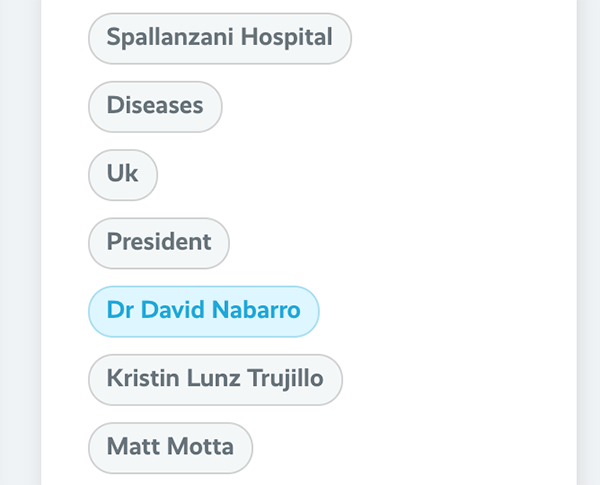

Towards the middle, or end, of the list of entities you’ll often find the names of people, or institutions, related to your topic. Add these terms to your search to prioritize the results containing them.
This is a great way to discover new angles or details you might have missed otherwise. In our example, we were able to quickly discover an Imperial College scientist forecasting additional lockdowns on a long road ahead to a working vaccine.
If we’re trying to write an article about remote working because of Coronavirus-related lockdowns…this is valuable information, and we discovered it in seconds.
Monitor competitor content and mentions
If you’re a smaller player in an industry, competing with larger entities, you have to be smart and strategic; always looking for avenues of differentiation and weaknesses to exploit.
If you’re the big fish in your pond, it’s still a good idea to keep tabs on the slightly smaller fish, that may one day challenge your dominance.
Either way, you’ll want to have a media monitoring practice in place, to make sure you’re not missing any opportunities or being outshined by your competitors.
Rather than an expensive press clipping service, or more complex solutions like Cision or Meltwater, you can easily monitor brand mentions with alerts from MarketChorus Resonance.
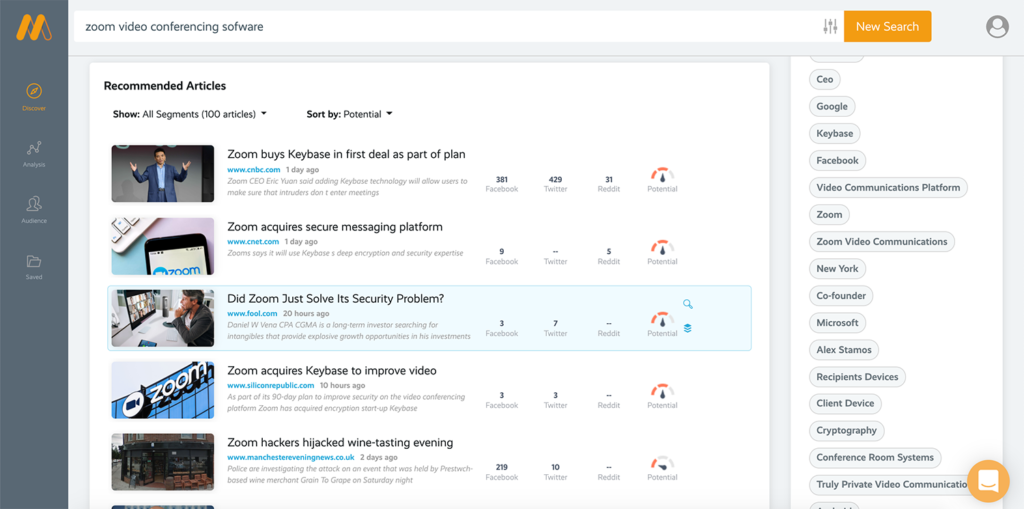
Let’s say you work for a competitor to Zoom, the ubiquitous video conferencing giant that has seen a meteoric rise in popularity during the crisis. Searching the web for content related to “zoom video conferencing” with MarketChorus will provide a snapshot of the conversation around their brand at any given time.
You can read these articles to understand your competitors’ messaging strategy, and dig through the Related Trends to look for opportunities. Controversies, announcements, and other timely matters will appear first in Related Trends as the situation evolves.
Analyze the top performing related content
Time is usually the greatest cost in content marketing, and there’s more involved in creating great content than simply writing, making graphics, or shooting video, etc. Coming up with ideas takes time. Research takes time. Obviously writing and publishing take time, but let’s not forget analyzing the results and optimizing that content later.
All of this work takes time and digital discussions are evolving much faster than optimization can take place, so most of the time content marketers are forced to pump out content in volume and just hope for the best.
Let’s turn that on its head. MarketChorus allows you to gather a great deal of intelligence before you start producing, reducing waste and improving your results. Think of it as “pre-optimizing” your content…
MarketChorus lets you look at content through the lens of social media by exposing engagement metrics and audiences for any URL you search (including competing content).
Sort Recommended Articles by engagement, in the MarketChorus dashboard, to surface the content that’s receiving the most shares, likes, and comments.
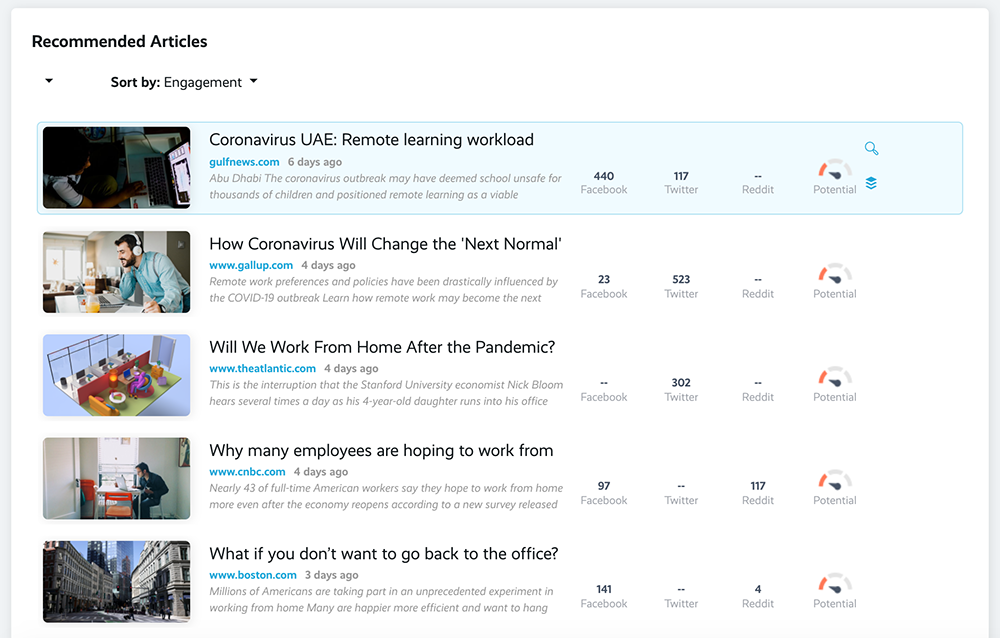
Examine the most engaged articles: What do they all have in common? How are they different from the articles with less engagement? Look at the headlines in particular…
Then examine the audiences that engage with this type of content. Look at their bios. Check to see what kind of articles and videos they typically share. Sampling the engaged audience and influencers for any topic can help you understand the people you’re writing for and what they might want.
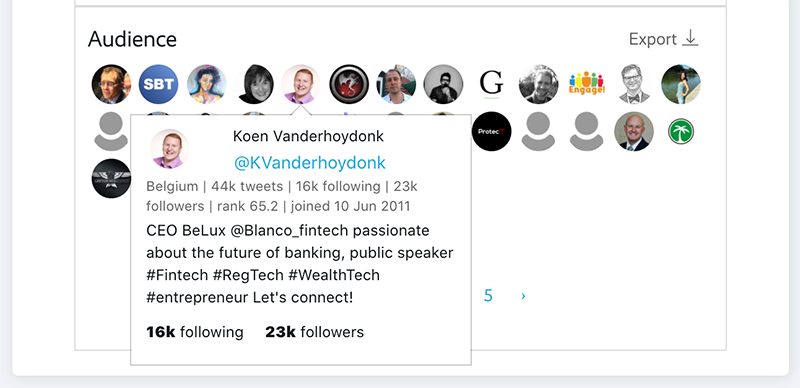
In summary…
There are a lot of advantages to a hybrid human-AI model for content marketing workflows, where you let creative minds focus on what they do best, and assign the redundant, time-consuming work to the machines.
Tasks like media monitoring, tracking competitors, and research can be easily automated using MarketChorus Resonance, returning a significant amount of time to its human operators.
And, armed with the insights gained from seeing all the competing content –and how it performs on social media– it’ll be easier to navigate the challenges of consistently producing results.
Try the platform for free today, and see for yourself. Here’s the original search I performed above: https://mchor.us/35L5N3O
For a demo of the full platform, with all of the advanced analysis tools, and other capabilities, just let us know you’re interested and we’ll be happy to give you a tour.
